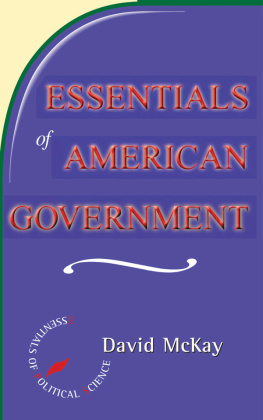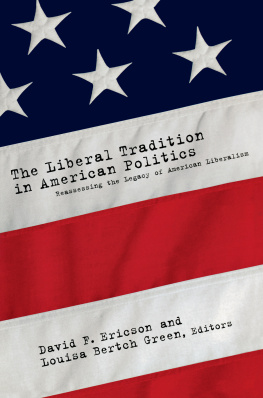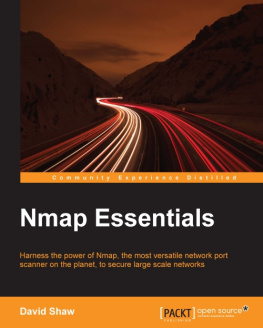Essentials of American Government
Essentials of Political Science
James A. Thurber, American University, Editor
The Essentials of Political Science series will present faculty and students with concise texts designed as primers for a given college course. Many will be 200 pages or shorter. Each will cover core concepts central to mastering the topic under study. Drawing on their teaching as well as research experiences, the authors present narrative and analytical treatments designed to fit well within the confines of a crowded course syllabus.
Essentials of American Government, David McKay
TITLES FORTHCOMING FOR 2000
Essentials of Political Research, Alan D. Monroe
Essentials of Political Science
First published 2000 by Westview Press
Published 2018 by Routledge
711 Third Avenue, New York, NY 10017, USA
2 Park Square, Milton Park, Abingdon, Oxon OX14 4RN
Routledge is an imprint of the Taylor & Francis Group, an informa business
Copyright 2000 by Taylor & Francis
All rights reserved. No part of this book may be reprinted or reproduced or utilised in any form or by any electronic, mechanical, or other means, now known or hereafter invented, including photocopying and recording, or in any information storage or retrieval system, without permission in writing from the publishers.
Notice:
Product or corporate names may be trademarks or registered trademarks, and are used only for identification and explanation without intent to infringe.
Library of Congress Cataloging-in-Publication Data
McKay, David H.
Essentials of American government / David McKay.
p. cm.(Essentials of political science)
Includes bibliographical references and index.
ISBN 0-8133-6755-7 (pbk.)
1. United StatesPolitics and government. I. Title. II. Series
JK274.M5143 1999
320.473dc21
99-048143
CIP
ISBN 13: 978-0-8133-6755-2 (pbk)
Publishers Note
The publisher has gone to great lengths to ensure the quality of this book but points out that some imperfections from the original may be apparent.
Perhaps the most distinctive feature of American government over the past thirty years has been the juxtaposition of quite dramatic changes in political institutions with an essentially unchanging political culture. Few question the transformation in the presidency since Vietnam and Watergate. In contrast to the midcentury incumbents, few recent presidents have been free to set the domestic policy agenda, and none has emerged from the experience unscathed by scandal or failure, or both. Congress, too, is a very different institution from that body thirty years ago. Congress used to be collegial, procedurally conservative, and deferential both to its own leaders and to presidents. Today it is combative, ideological, and rarely accommodating to the appeals of leaders. Ideologically, the Supreme Court has made the transition from liberal activism to an uncertain and often passive conservatism. Finally, the role of the states has been transformed. Once regarded as unprofessional, regressive, and often corrupt in relation to the federal government, they are today at the forefront of policy initiation and experimentation. In total, these changes have increased the institutional fragmentation that has always been a feature of the American system. They have also made the United States a harder place to govern.
Yet in spite of these institutional changes, no equivalent shift has occurred in the fundamentals of how Americans view politics. True, distrust of political authority and especially the federal government has increased appreciably. But the conviction that limited government is good government has always been a defining theme of American political culture. At the same time, at least since the New Deal Americans have had high expectations of the federal government, whether measured in terms either of the moral authority of individual politicians or of the specific benefits the government can provide.
High public expectations in the context of a culture of limited government and institutional fragmentation is the theme of this book. Almost every text on American government stresses the institutionally fragmented nature of the political system. This was, of course, part of the founders original design, with federalism and the separation of powers being the most distinctive features of the new republic. The stock argument is that these features not only have persisted through time but also have become more pronounced, so that today fragmentation makes the business of building winning coalitions at the federal level extremely difficult. Hyperpluralism, gridlock, and ungovernability are some of the more vivid descriptions applied to this phenomenon.
In one important sense, however, these analyses are now out-of-date. The gridlock literature was fueled by perceptions that the U.S. economy was performing poorly compared with other countries, that the budget deficit was out of control, that nothing could be done to reduce welfare dependency, and that domestic pressures would make it impossible to define the U.S. world role. In 1999 the performance of American government in relation to all these problems was looking remarkably good, and especially so in comparative perspective.
Notwithstanding the view that recent improvements may be temporaryor even illusorytoday it is clearly inappropriate to identify failure as the defining feature of American government. Instead, the mark of its uniqueness is the combination of high public expectations with a philosophy of limited government. Both a Republican Congress and Democratic president extol the virtues of less government but continue to grapple with demands for improved education, health care, transportation, and so on. All praise the virtues of lower taxes and at the same time promise improvements in the quality of public services. The same tension applies in the courts, in state politics, and indeed throughout the system. Foreign and defense policies are also affected by it: Support for a major U.S. world role remains high, but serious tensions exist over the costs implicit in an active world role, whether measured in terms of money or the lives of American service personnel. Recent successes such as a balanced budget have been achieved in part because the limited-government philosophy has been on the ascendant and has won support from all shades of political opinion. At the same time, conflict over the distributional questions of who gets what has hardly subsided.
This theme works well when comparing the United States with other nations for two reasons. First, in few countries is the philosophy of limited government as well established as in the United States. Lower taxes are not a dominant value in Germany, France, Italy, or the UK, for example. Second, in few countries is democracy so well developed and access to the institutions of government so easy as in the United States. The U.S. political system is highly accessible to public demands, yet satisfying those demands is difficult to reconcile with limited government. Essentials therefore strives to make students aware of this unique combination through selected comparative references.
David McKay
Santa Barbara, California
I owe a debt of thanks to a number of individuals and institutions. The Department of Political Science, University of California, Santa Barbara, provided an amenable environment for much of the writing of the book. Thanks to Stephen Weatherford and Lorraine McDonnell for their hospitality and support. I must also thank my home institution, the Department of Government, University of Essex, for continuing to provide a stimulating and always challenging intellectual environment in which to work. Leo Wiegman of Westview Press was always encouraging and supportive, as was the series editor, James Thurber, and a number of the publishers readers and referees. Finally, thanks to Sherri Singleton for her forbearance and encouragement amid much transatlantic comings and goings.









